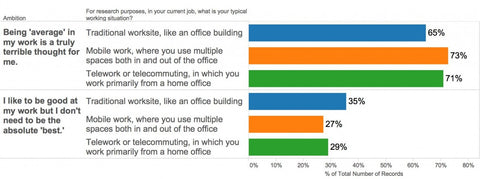You're 87% More Likely To Love Your Job If You Work From Home
Only 24% of people who work in an office say they love their jobs. But 38% of mobile workers and a whopping 45% of telecommuting workers love their jobs!
Leadership IQ surveyed 3,478 employees using an online test called “Is Your Personality Suited To Working Remotely Or In The Office?” (you can take it yourself here).
We discovered that people who work from home (i.e., telecommuting) are almost twice as likely to love their jobs than employees who work in traditional co-located work-sites (like office buildings). And mobile workers (i.e., using multiple workspaces, in and out of the office) were about 58% more likely to love their job than their office-based peers.
First we asked people where they usually work (in an office, mobile or telecommute). And then we asked people to rate how they felt about their job (love, like, tolerate, dislike or hate). Here’s what we found.

It’s clear from the chart that people who work remotely (whether telecommuting or being mobile) are significantly more likely to love their job. And employees who work remotely are significantly less likely to dislike or hate their jobs.
Parenthetically, every time we see the latest statistics about the sorry state of employee engagement, perhaps we should ask whether those employees are working in traditional offices or working remotely.
Now, some cynics will look at the data and say “of course telecommuters love their jobs, they sit in their pajamas all day doing nothing!”
Fortunately, we have some data from the test that debunks this notion. Two simple ways to test “why” telecommuting employees love their jobs is to look at their ambition and how they meet deadlines.
To assess ambition, we asked respondents to choose between two statements…
- Being “average” in my work is a truly terrible thought for me.
- I like to be good at my work but I don’t need to be the absolute “best.”
Obviously, those who can’t stand to be average are going to rate as having more ambition than those who don’t need to be the best. So, if we take everyone who said they love their job and we look at their ambition, remote workers (telecommuting and mobile workers) display more ambition than those in traditional work-sites. Here’s the chart:

If you want a workforce filled with hard-charging go-getters, whom would you rather hire: people who can’t stand being average or those who don’t want to be the best? Of course, you want the former. And the data shows that telecommuting and mobile workers who love their jobs are more likely to strive to be the best.
We also discovered significant differences between remote workers and in-office workers in how they treat deadlines. We asked respondents to choose between two statements…
- I hit deadlines no matter what, even if that means pulling all-nighters.
- I sometimes need to ask for a little more time to finish projects on deadline.
Again, if we look at only those workers who love their jobs, we see that remote workers (both telecommuting and mobile workers) are significantly more likely to say they’re willing to pull all-nighters than their office-based peers.

Here’s my interpretation of the data. First, we can see that remote workers (both telecommuting and mobile workers) are more likely to love their jobs than people in the office. But why? The data suggests that to love working remotely you’ve got to have a hard-charging, go-getter, self-motivated mindset.
Working remotely isn’t always easy; there’s isolation, a fear of missing out, miscommunication and more. So it seems that to overcome those pitfalls, a successful remote worker has to be driven and hard working. There’s often less support (emotional, administrative, managerial, etc.) for telecommuting and mobile workers. So the only way for them to survive and still achieve their desired career success is to push themselves to be the best and be willing to work all night to hit every deadline.
Working remotely is not for everyone, nor is it for every company. To assess your own fit, I’d encourage you to take the online test.
The data in this article only scratches the surface of the telecommuting issue. But I do hope this data helps dispel the stereotype that working from home (i.e., telecommuting) means sitting in pajamas, watching television, doing laundry and only occasionally working.
To work remotely and love it requires striving harder and working longer. And while that’s certainly not for everybody, those traits are a far cry from the negative stereotypes we often hear.
Mark Murphy is a NY Times bestselling author, founder of Leadership IQ, a leadership training speaker, and creator of the leadership styles assessment.







